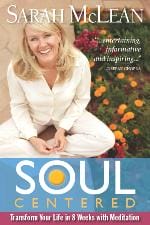Soul Centered

An Interview with Sarah McLean
Author of the book, Soul Centered
 Sarah, how long have you been a meditator? How did meditation transform your life?
Sarah, how long have you been a meditator? How did meditation transform your life?
I have been a meditator for 22 years, though I wanted to learn to meditate years before that. I just didn’t know where to turn. I was a sad, stressed, confused young woman, and I searched everywhere-even traveling to other continents-to find peace and relief. When I finally found meditation, it was the key to transforming my life- from one of suffering and pain to one of inner fulfillment.
My meditation practice helped me to know who I really am, what I truly want, and find that peace I had always searching for “out there”. I am certainly living a fulfilling life now, and have been for years– a peaceful, satisfying and magical life- one beyond my wildest dreams!
Is it really possible for someone to transform his or her life in eight weeks with meditation? How?
Absolutely. Research proves it. Studies show that those who meditate almost 30 minutes a day on average, for eight weeks, have measurable changes in brain regions associated with their memory, sense of self, empathy, and stress response. In a study that appeared in Psychiatry Research: Neuroimaging, a team led by Massachusetts General Hospital (MGH) researchers report the results of their study, one of the first to document meditation-produced changes over time in the brain’s grey matter. Less stress, more empathy, and a greater sense of self would change anyone’s life. And that’s only the beginning of the transformations that can occur.
What does Soul-Centered mean and how did you come up with that for the title of the book?
I came up with the term “soul-centered” to describe a shift in perspective which meditation cultivates: a transformation of the vantage point for one’s life. I’ve seen it in my students and in my own life. And there wasn’t a word for it. For example: how do you answer the question, “How are you?” Many of us look to our external world to determine the response. We base how we’re doing on outside factors such as our relationship status, our work life, our state of health or wellbeing, our financial situation, and sometimes even on worldwide events.
With daily meditation, you connect to your essence, your awareness, or what some people call “the soul.” Though it’s always been there, meditation helps you to experience the soul’s qualities: peacefulness, stillness, creativity, wisdom, awareness, acceptance and more self-awareness on purpose. This gives you a moment of respite from the external world. Eventually, these soul qualities radiate outward.
With this practice, this soul’s connection becomes more prevalent in your awareness – no longer overshadowed by external conditions. This transforms your perspective. So when you go to answer the question “How are you?” you don’t look toward externals. Instead, your reference point is internal. You check in. This is what being soul-centered means.
You’ve worked with some of the leaders in the personal transformation industry: Deepak Chopra, Debbie Ford, Gary Zukav, Byron Katie. Did each of these experts have the same message just delivered differently? What was the greatest lesson you learned from each of them and how did they influence you as a meditation teacher?
I am truly fortunate. I was searching for the knowledge that each one delivers so eloquently, and that quest led me to each one of them, right on time. I didn’t plan it this way. I first worked with Deepak Chopra, back then I called him Dr. Chopra, because I was in love with the new paradigm he espoused. I use much of what I learned from him about mind-body health-the ancient science of Ayurveda and meditation even today. Debbie Ford was totally tapped into the shadow work, and I worked with her early on. She was so genuine and confidents and her work helped me to embrace aspects of myself I had previously hidden. She made it so easy. Then, Gary Zukav asked me to work for him, and I said yes. His book, The Seat of the Soul was one of the first books I had read that began to satisfy my craving for a new perspective in this life. Working for him helped me to develop confidence in my communication skills and to be a much more present listener. I turned to The Work of Byron Katie because I was still suffering emotionally from previous relationships, even with my meditation practice. I had continued to tell myself stories that just weren’t true, and that made me so sad. Her work helped me to love my life, and to do inquiry practices to see clearly into stressful situations.
Each of them has their own unique way of being in the world and certainly each of them is an amazing teacher in his or her own right. You will find their influences in some of the practices in my book, Soul-Centered. I am very grateful for their presence in my life.
Meditation seems to be becoming more mainstream. Celebrities do it, basketball coaches like Phil Jackson have their teams meditate. Oprah has her staff meditate. Does the research show that way method is better than another? And what are some of the benefits?
There are many different ways to meditate, perhaps hundreds. I often say that the best meditation is the one that you do. The practice of meditation is like brushing your teeth. You do it because we like the way it makes you feel right away, and you know it has long-term benefits. You don’t hem and haw each day to determine if you are going to do it. You simply do it.
Research shows countless benefits of meditation: stress reduction, improvement with sleeping, lowered blood pressure, increased blood flow, decreased respiratory rate. It relieves anxiety, depression and even improves your job performance and relationships. I could go on and on about the benefits of meditation. There is really no good reason NOT to meditate. It’s always a good time to start your daily practice.
In terms of different kinds of meditation, I believe the simpler, the better. I generally find there are meditation practices, and then there are meditative practices. Each requires two things: your attention and a focus for your attention. For instance, meditation practices can include focusing on your breath, a mantra, or a candle flame. Meditative practices can include focusing on an activity such as a walking meditation, or a prayer, and can include a visualization practice. In the book Soul-Centered, the reader learns a multitude of meditation and meditative practices they can easily fit into their lives.
The research about the brain changing in eight weeks was based on a simple mindfulness meditation, paying attention to the movement of the breath and sensations in the body in sitting meditation. There are some differences in how the brain and the body respond to meditation and meditative practices.
However, the most important thing is to choose a practice and do it regularly.
Many people say they just can’t meditate. It’s too hard to stop the thoughts or quiet the mind. What suggestions do you have for these folks?
The most important thing is to find a meditation practice that you like and to stick with it. I know, I know, the number one complaint I hear is – I just can’t stop thinking. I tell my students that it’s the nature of the mind to think; just the nature of a dog is to bark. Meditation certainly does quiet the mind and the thinking process, but not because you think about quieting the mind. In fact, that’s why you have to choose a focus for your meditation, whether it’s your breath, a mantra, or even something you gaze upon, such as a candle flame, this helps you to refocus the attention away from the thoughts to the meditation practice.
If a thought arises while you’re trying to meditate, and if you’re human, they most certainly will, then simply observe it without judgment, and go back to the focus of your meditation. Eventually, you’ll find that it gets easier. Your relationship to your thoughts changes. You simply observe thoughts as they arise and then let them go. Maybe they let you go!
It’s also important to know that the purpose of meditation is not to stop the thoughts or quiet the mind or to have certain experiences of any kind. The benefits of meditation are not dependent on any kind of experience you have in meditation. Instead, the purpose of meditation is to have a wonderful, satisfying life.
What’s the biggest change you’ve seen in someone who has incorporated the practice of meditation into his or her life?
I’ve seen extraordinary changes in my students: some have become free of lifelong chronic illness, some whose cancer went away, some found their creativity and began to do amazing works of art. Others left toxic relationships, some changed jobs to follow a dream they hadn’t realize they had before they began their practice. I’ve seen people lose enormous amounts of weight after they’ve meditated regularly, some whose blood pressure normalized, some who those who found their life purposes. I truly can’t think of one person’s life that meditation has NOT changed.
Does meditation actually make you younger or help you create more of the youth hormone? I’ve heard that.
Yes! That’s one of the many benefits I’ve noticed. In one study, published over a period of years in three different medical journals, the researchers measured biological age, blood pressure, vision and hearing, and they all improved for age with a silent meditation practice. Those practicing meditation for five years were physiologically 12 years younger than the non-meditating group. Even the short-term meditators were physiologically five years younger than the control group.
Another study on aging and meditation was conducted by researchers at Harvard. This study evaluated elderly people who were introduced to meditation. Numerous beneficial changes occurred and the meditators lived longer on average than patients in the control group that did not meditate. A follow-up study was conducted more than 10 years later and garnered similar positive results. Meditation creates flexibility in the brain (known as neuroplasticity), normalizes hormones, even increasing DHEA which is considered a youth hormone, increases memory, and normalizes blood pressure. All markers of youthfulness!
We’re all so busy. Now in addition to eating well and going to the gym, I need to fit in one more wellbeing tool—meditation. And you suggest 30 minutes/twice a day? Is there a secret to how to fit it into your life?
I’ve found, and so have my students, that when you fit in 20-30 minutes of meditation first thing in the morning, then your entire day goes more smoothly. If you can’t do that, five minutes once a day will show some benefits. You see, meditation creates a settling of the mind and body, and relieves stress that has built up over time. This has an effect on your whole life. Think about it, how long do you wait in line at Starbucks? How long do you spend surfing the internet? Set your priorities. Give yourself the same amount of time to do something that will garner proven results – results that will ultimately transform your life.
 To learn more or to purchase the book, visit: http://www.soul-centered.com
To learn more or to purchase the book, visit: http://www.soul-centered.com
Sarah McLean, an inspiring contemporary meditation teacher, makes meditation accessible to everyone. She has spent much of her life exploring the world’s spiritual and mystic traditions, and has worked with some of today’s great teachers, including Deepak Chopra, Byron Katie, Debbie Ford, and Gary Zukav. She’s lived and studied in a Zen Buddhist monastery, meditated in ashrams and temples throughout India and the Far East, spent time in Afghan refugee camps, bicycled the Silk Route from Pakistan to China, trekked the Golden Triangle in Southeast Asia, and taught English to Tibetan Buddhist Nuns in Dharamsala.
Sarah is the founding director of the Sedona Meditation Training Co. (www.SedonaMeditation.com), and The McLean Meditation Institute (www.McLeanMeditation.com) educational companies offering meditation training, self-discovery retreats, and teacher training certification programs that have transformed thousands of lives, and have earned her the praise of her peers and students.
OMTimes Magazine is one of the leading on-line content providers of positivity, wellness and personal empowerment. OMTimes Magazine - Co-Creating a More Conscious Reality



